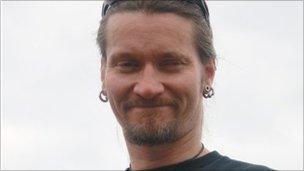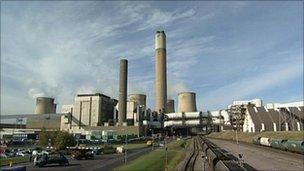Lawyer criticises police on undercover Pc Mark Kennedy
- Published
Defence lawyer Mike Schwarz: "These events beg wider, serious questions"
The solicitor for six green campaigners says police need to answer "serious questions" about an undercover officer who infiltrated their group.
Mike Schwarz said efforts to charge the six with conspiring to shut down the Ratcliffe-on-Soar power station in Nottingham were a "serious attack on peaceful, accountable protest".
The case was suddenly dropped.
It emerged that undercover Pc Mark Kennedy had offered to give evidence on the campaigners' behalf.
Mr Kennedy had been intimately involved in the green movement since 2000. He told the defence team he would be prepared to help them, and the prosecution then offered no evidence before the trial was due to get under way.
Confronted
Mr Schwarz, a solicitor at Bindmans law firm which represented the activists, was speaking outside Nottingham Crown Court after the collapse of his clients' trial.
He said: "My clients were not guilty. They did not agree to join in any plan to occupy the power station. The evidence of Pc Kennedy presumably confirmed this.
"Yet that evidence, had it been kept secret, could have led to a miscarriage of justice.
"Serious questions must be asked relating to the whole policing of this protest, from the use of undercover police officers, to the use of expensive and legally questionable mass pre-emptive arrests, to the use of pre-charge unaccountable bail conditions, to the seemingly arbitrary nature by which the 114 initially arrested were reduced to the final 26 who were eventually charged."
A CPS spokeswoman said that "previously unavailable information that significantly undermined the prosecution's case" had come to light on 5 January.
She said: "In light of this information, the Crown Prosecution Service reviewed the case and decided there was no longer sufficient evidence for a realistic prospect of conviction."
The Met Police are refusing to comment officially on Mr Kennedy and would not say whether or not he is still a police officer.
Twenty protesters were sentenced to a mixture of community orders and conditional discharges last week, after being convicted conspiracy to commit aggravated trespass at Ratcliffe.
Mr Schwarz said the case raised "key questions" over the cost of deploying the undercover officer and whether it was reasonable to incur "hundreds of thousands of pounds" to "infiltrate peaceful, accountable, open, democratic protesters who are concerned about a very pressing issue - climate change".
He added: "This is a serious attack on peaceful, accountable protest on issues of public and pressing importance like climate change.

Pc Mark Kennedy spent years working undercover in the green movement
"One expects there to be undercover police on serious operations to investigate serious crime. This was quite the opposite.
"This is civil disobedience which has a long history in this country and should be protected."
Mr Schwarz had earlier said he had "no doubt that our attempts to get disclosure about Kennedy's role has led to the collapse of the trial".
He added: "It is no coincidence that just 48 hours after we told the CPS our clients could not receive a fair trial unless they disclosed material about Kennedy, they halted the prosecution.
"Given that Kennedy was, until recently, willing to assist the defence, one has to ask if the police were facing up to the possibility their undercover agent had turned native."
Danny Chivers, who was one of the six defendants in the failed case, said Mr Kennedy was not just an observer, but an agent provocateur.
"We're not talking about someone sitting at the back of the meeting taking notes - he was in the thick of it."
Truck hire
Mr Kennedy lived a double life as Mark Kennedy of the Metropolitan Police and as Mark Stone, green activist, based in Nottingham.
He was known within the green campaign as Mark "Flash" Stone, having earned the nickname because he always seemed to have more money than the other activists.
But in October 2010, Mr Kennedy was confronted by some of the activists after they found documents which revealed his true identity.
He admitted he had been a Met Police officer and had infiltrated their organisations, before then disappearing.
Speaking about the Ratcliffe-on-Soar protest, Mr Chivers said: "Mark Stone was involved in organising this for months - they could have stopped it at the start."
Instead, Mr Chivers said the police officer helped recruit as many people as possible.
He also drove a reconnaissance party to the power station in his van and then hired a truck for the main protest, Mr Chivers added.
The activists' plan was to try to shut down the coal-fired power station for a few days as a protest against global warming.

Twenty people were convicted over the Ratcliffe-on-Soar case last year
But in April 2009, when 114 people had gathered for a meeting at the Iona School in Nottingham, hundreds of police swooped on the building and arrested them all for "conspiracy to commit aggravated trespass".
Ratcliffe-on-Soar was one of many actions in Britain and across Europe which Mr Kennedy was involved in, including the protests against the G8 summit at Gleneagles in 2005 which helped give birth to the Climate Camp movement.
When confronted, Mr Kennedy told the activists he left the police after the Nottingham arrests in 2009.
It is unclear whether this is true, or where he is now.
David Winnick, a Labour member of the House of Commons Home Affairs Select Committee, has called for Home Secretary Theresa May to make a statement to MPs on the case, saying his concern was "the manner in which it has been alleged that Kennedy acted almost as an agent provocateur".
Find out more on BBC2's Newsnight at 2230 GMT on 10 January
- Published10 January 2011
- Published5 January 2011
- Published6 January 2011
- Published10 January 2011